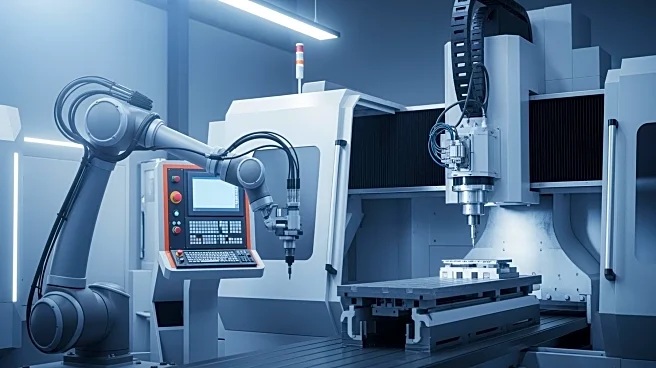What's Happening?
Manufacturers are increasingly adopting automation and modern machining techniques to enhance efficiency and reduce waste, as part of efforts to achieve sustainable machining goals. The industry faces
pressure to improve processes due to its significant environmental impact, with a quarter of global emissions attributed to manufacturing. Upgrading machinery and cutting tools for energy efficiency, embracing circular manufacturing, and building ethical supply chains are key strategies being employed. Automation is seen as a way to increase accuracy and speed, thereby reducing material waste and production costs.
Why It's Important?
The push for sustainable machining practices is crucial in the context of global efforts to combat climate change. By reducing emissions and waste, manufacturers can contribute to environmental goals while also benefiting from cost savings and increased productivity. The adoption of automation and energy-efficient technologies not only helps in achieving net-zero targets but also positions manufacturers to be more competitive in a market increasingly focused on sustainability. This shift could lead to long-term benefits for the industry, including improved public perception and compliance with environmental regulations.
What's Next?
Manufacturers are expected to continue investing in automation and sustainable practices, with gradual implementation to manage costs. As these technologies become more widespread, companies may explore further innovations in energy efficiency and waste reduction. The focus on circular manufacturing and ethical supply chains is likely to grow, with potential collaborations between industry leaders and environmental organizations to drive these initiatives. Monitoring and data analysis will play a critical role in identifying areas for improvement and ensuring the effectiveness of sustainability efforts.
Beyond the Headlines
The move towards sustainable machining practices highlights broader ethical considerations in manufacturing, such as the responsibility to reduce environmental impact and promote social welfare. Companies may face increased scrutiny from consumers and regulators, prompting a shift towards transparency and accountability in their operations. This trend could lead to a cultural change within the industry, where sustainability becomes a core value rather than a compliance requirement.












